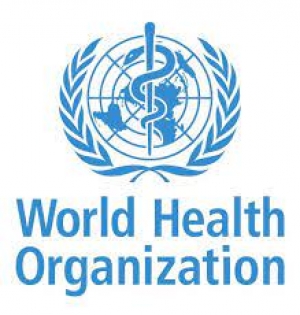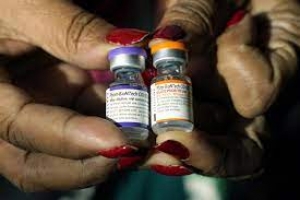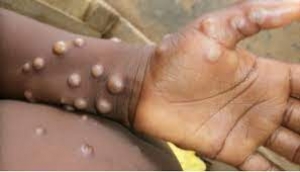Haemorrhage, hypertension responsible for 50% of maternal deaths in Africa —WHO
The World Health Organisation has identified complications of haemorrhage and hypertension as major killers of pregnant women in the Africa Region. The global health body said complications of haemorrhage and hypertension account for almost 50 per cent of maternal mortality in the region.
The WHO called on member states to ensure that all women and girls have access to quality and timely health services, particularly during pregnancy, childbirth, and after delivery, noting that no one should be left behind.
FDA approves Pfizer COVID-19 booster shots for children ages 5 to 11
The United States Food and Drug Administration has approved for emergency use a single booster dose of Pfizer/BioNTech’s COVID-19 vaccine for children ages 5 to 11. The booster dose, FDA said, should come at least five months after the completion of the primary vaccine series with the Pfizer-BioNTech COVID-19 Vaccine.
“While it has largely been the case that COVID-19 tends to be less severe in children than adults, the Omicron wave has seen more kids getting sick with the disease and being hospitalised, and children may also experience longer-term effects, even following initially mild disease,” said FDA Commissioner, Robert M. Califf, M.D.
Monkeypox can be transmitted through kissing, hugging, expert says
A professor of Public Health, Dr. Tanimola Akande says monkeypox can be transmitted by close face to face contact, hugging, and kissing. Prof. Akande also said that it can also be transmitted through body contact during sex.
According to the World Health Organisation, human-to-human transmission of monkeypox can result from close contact with respiratory secretions, skin lesions of an infected person, or recently contaminated objects.
Stay away from bushmeat to prevent monkeypox, NCDC urges Nigerians
The Director-General of the Nigerian Centre for Disease Control, Dr. Ifedayo Adetifa has urged Nigerians to avoid bushmeat as a way to curb the spread of the monkeypox. He said, “I think it is important that we be careful – I’d prefer to shun – but also careful in handling all bushmeat.
“The greatest risk to health security as you know is going to be zoonotic diseases and zoonotic illnesses are like Sars-Cov-2 like pathogens that primarily affect animals but acquire the capability to humans and what happens thereafter is if they change once they infect the first humans, they become more effective in person-to-person transmission. So we should be careful.”
Stop consuming suya roasted with open flames, physician tells Nigerians
A health expert, Dr. Chinonso Egemba, has cautioned Nigerians against consuming ‘suya’ that is not properly cooked, noting that consuming such can lead to cancer. ‘Suya’ is a Nigerian street snack that is made with beef and spices.
The medical practitioner, popularly known as ‘Aproko Doctor’ on social media explained that the problem with consuming ‘suya’ is not necessarily the meat, but the method in which it is being prepared.
Why you should cut your fingernails, not wear jewellery while cooking —Physician
The Director-General, Nigerian Institute of Medical Research, Yaba, Lagos, Prof. Babatunde Salako, has urged women and food handlers to avoid keeping long fingernails and wearing jewellery while cooking, noting that long nails and jewelry could serve as a means of contamination to the food.
Prof. Salako explained that foods that are poorly handled during preparation could be contaminated, noting that those who consume such foods could come down with diseases.
How new moms can regain their skin colour –Gynaecologist
A professor of Fetomaternal medicine, Babagana Bako, has urged women whose skin darkened after pregnancy to embrace exercise to regain their skin colour after birth, noting that the darkening of the skin was due to hormones.
Bako, who is also an Obstetrician & Gynaecologist, stated that engaging in exercise would help new mothers to quicken the process of regaining their once glowing skin. He also urged new mothers to avoid using bleaching products in a quest to lighten their skin after birth.
Get tested before taking antimalarials, physician tells Nigerians
A Professor of Public health, Dr. Tanimola Akande, has warned Nigerians against taking antimalarials without first getting tested, noting that it is wrong to take malaria medication to treat fever.
Prof. Akande explained that other health conditions aside from malaria can cause fever. The public health expert also cautioned against taking malaria medications recklessly for prevention, stressing that it is always advisable to first get properly diagnosed before treating any disease.
UNICEF, WHO warn of ‘perfect storm’ for measles outbreaks
The World Health Organisation and United Nations International Children’s Emergency Fund have warned that the global disruptions experienced in various parts of the world are creating a perfect storm of conditions for a measles outbreak.
The world agencies noted that almost 17,338 measles cases were reported worldwide in January and February 2022, compared to 9,665 during the first two months of 2021 which indicates a 79 per cent increase from last year.
Don’t neglect your medications, ophthalmologist tells patients with diabetes, hypertension
A Consultant Ophthalmologist, Dr. Adegboyega Alabi, has urged elderly people living with diabetes to take their drugs regularly to avoid complications associated with the chronic disease and possible vision loss.
Dr. Alabi who is a Lecturer in the Department of Ophthalmology, Faculty of Clinical Sciences, College of Medicine, University of Lagos, said any elderly that has diabetes or other chronic conditions like hypertension, stroke, kidney disease, among others, must ensure that they manage those conditions properly owing to the impact of the COVID-19 pandemic.
















